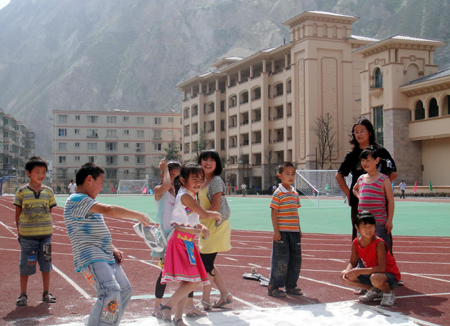Society
- Details
- By Mengxin
- Hits: 1067

Students play at school on the first day at the newly-built Beichuan No. 1 Primary School, Beichuan Qiang Autonomous County, southwest China’s Sichuan province, August 24, 2009. The new school was built with aid from the Guangzhou construction authority.
- Details
- By Mengxin
- Hits: 862
 |
|
A worker prepares decorations for the Spring Festival Temple Fair at Ditan park in Beijing February 2, 2010. Red decorations are customarily used by the Chinese to usher in the Lunar New Year, which starts on February 14 this year.[Photo/CFP] |
- Details
- By David Cao
- Hits: 845
China's on-line gamers may soon find their favorite games come with an age rating to show whether they are suitable for children or for adults only.
In Beijing, more than 30 on-line game operators led by the Beijing Animation and Game Industry Alliance have agreed to make age recommendations for players.
Alliance secretary-general Liu Chungang said the system was voluntary and was designed to protect young players.
Liu Chungang said alliance members would be required to add age tags such as "For adults" or "Suitable for all ages" by March.
In Shanghai, about 30 online game operators, including Shanda, the second-largest online game operator, have joined the campaign. Tencent, the largest online game operator, so far has not responded to the initiative.
- Details
- By David Cao
- Hits: 4692
How to kill a dog? this is not a question in any country - Just do it in the way of killing pig. But why to kill dogs? different country will have totally different answers.
In Far East ( especially in China, Korea), To Kill dogs just for eating dog.
In their culture, "dog is a faithful friend" doesn't against "Dog meat is delicious".
Here are the Kill-Dog photos for Eat-Dogs: If you are ready, click read more to continue
Read more: Kill Dog for Dog Meat, Killing Dog Cases in China (Gallery)
- Details
- By David Cao
- Hits: 738
Billionaire investment sage George Soros sat down with CNBC's Maria Bartiromo as he met with other tycoons at their annual pow-wow in Davos. (Check out the other big shots that showed up)
Soros, who heads Soros Fund Management and has amassed a fortune worth $13 billion, shared his thoughts about the stimulus (it worked), U.S. banks (they're still too big), China (it's growing too fast), and the U.S. Dollar (better to keep it weak). Here are some of his thoughts.
Read more: Soros: Curb Banks, Slowdown China, Keep Dollar Weak.
More Articles …
Page 165 of 255